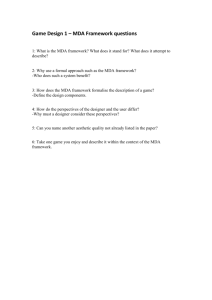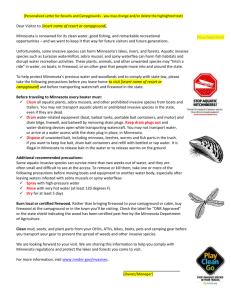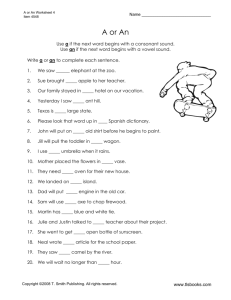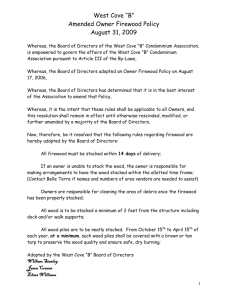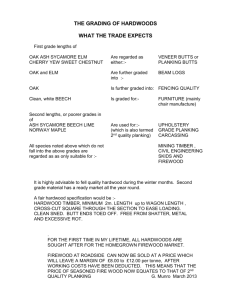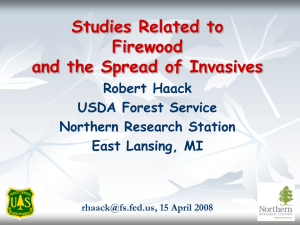FIREWOOD ALERT MINNESOTA REGULATES THE MOVEMENT OF FIREWOOD
advertisement
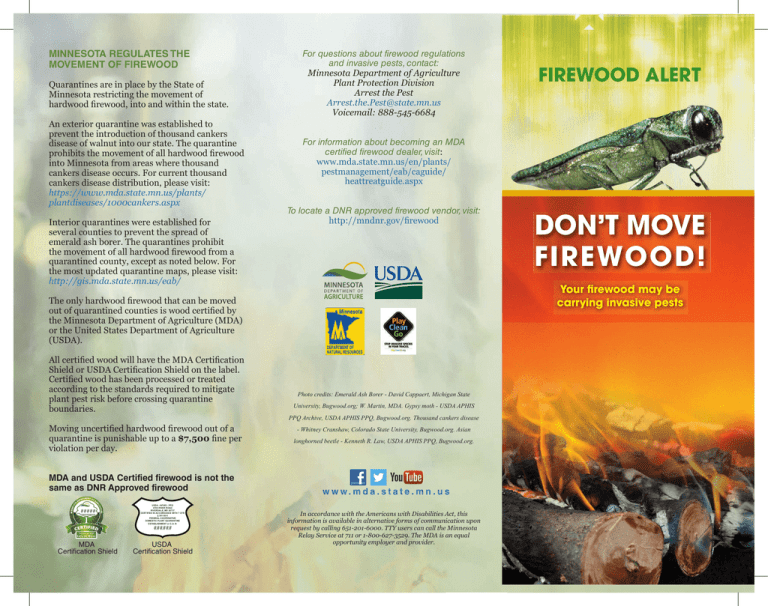
MINNESOTA REGULATES THE MOVEMENT OF FIREWOOD Quarantines are in place by the State of Minnesota restricting the movement of hardwood firewood, into and within the state. An exterior quarantine was established to prevent the introduction of thousand cankers disease of walnut into our state. The quarantine prohibits the movement of all hardwood firewood into Minnesota from areas where thousand cankers disease occurs. For current thousand cankers disease distribution, please visit: https://www.mda.state.mn.us/plants/ plantdiseases/1000cankers.aspx Interior quarantines were established for several counties to prevent the spread of emerald ash borer. The quarantines prohibit the movement of all hardwood firewood from a quarantined county, except as noted below. For the most updated quarantine maps, please visit: http://gis.mda.state.mn.us/eab/ For questions about firewood regulations and invasive pests, contact: Minnesota Department of Agriculture Plant Protection Division Arrest the Pest Arrest.the.Pest@state.mn.us Voicemail: 888-545-6684 For information about becoming an MDA certified firewood dealer, visit: www.mda.state.mn.us/en/plants/ pestmanagement/eab/caguide/ heattreatguide.aspx To locate a DNR approved firewood vendor, visit: http://mndnr.gov/firewood Moving uncertified hardwood firewood out of a quarantine is punishable up to a $7,500 fine per violation per day. MDA and USDA Certified firewood is not the same as DNR Approved firewood ##### CERT I F I ED USDA - APHIS - PPQ 4700 RIVER ROAD RIVERDALE, MD 20737 CERTIFIED IN ACCORDANCE WITH 7 CFR § 301.92-5 FEDERAL COOPERATIVE DOMESTIC PLANT QUARANTINE ESTABLISHMENT or C.A. #: ###### ____ ____ ____ Treated fo r E AB S afe to M ove MDA Certification Shield USDA Certification Shield DON’T MOVE FIREWOOD! Your firewood may be carrying invasive pests The only hardwood firewood that can be moved out of quarantined counties is wood certified by the Minnesota Department of Agriculture (MDA) or the United States Department of Agriculture (USDA). All certified wood will have the MDA Certification Shield or USDA Certification Shield on the label. Certified wood has been processed or treated according to the standards required to mitigate plant pest risk before crossing quarantine boundaries. FIREWOOD ALERT Photo credits: Emerald Ash Borer - David Cappaert, Michigan State University, Bugwood.org; W. Martin, MDA. Gypsy moth - USDA APHIS PPQ Archive, USDA APHIS PPQ, Bugwood.org. Thousand cankers disease - Whitney Cranshaw, Colorado State University, Bugwood.org. Asian longhorned beetle - Kenneth R. Law, USDA APHIS PPQ, Bugwood.org. w w w. m d a . s t a t e . m n . u s In accordance with the Americans with Disabilities Act, this information is available in alternative forms of communication upon request by calling 651-201-6000. TTY users can call the Minnesota Relay Service at 711 or 1-800-627-3529. The MDA is an equal opportunity employer and provider. FIREWOOD DOS AND DON’TS S Do Buy local firewood. Burn all firewood completely at each destination. Move only Minnesota Department of Agriculture (MDA) and United States Department of Agriculture (USDA) Certified firewood out of a quarantine county or across state boundaries. (See logos in the “Minnesota Regulates the Movement of Firewood” section) Use firewood from nearby sources to heat your home or cabin. Tell your friends about the importance of not moving firewood. Don’t Move hardwood firewood out of a quarantine county, unless it is MDA or USDA Certified. Move opened firewood bundles. Move firewood long distances to or from your lake home or cabin. WHY ARE INVASIVE PESTS A PROBLEM? WH Emerald ash borer and Gypsy moth are examples of invasive pests that have killed millions of trees in nearby states. In their native ranges these pests are kept in check by native predators. In the United States we do not have these native predators so populations explode. Others, such as thousand cankers disease of walnut, Asian longhorned beetle and sirex woodwasp pose threats to the health of Minnesota’s trees and forests. EMERALD ASH BORER E THOUSAND CANKERS DISEASE Agrilus planipennis Emerald ash borer larvae feed on the inner bark of ash trees (Fraxinus sp.), girdling and killing the trees. It was discovered in southeastern Michigan in 2002 where it killed tens of millions of trees. It was first confirmed in Minnesota in 2009. With the largest concentration of ash trees in the country (almost one billion), Minnesota has much to protect. Found in Minnesota Found in Eastern U.S. Found in Western U.S. Thousand cankers disease attacks walnut, butternut and other Juglans species. It is caused by a fungus (Geosmithia morbida), which is spread by the walnut twig beetle (Pityophthorous juglandis). The disease caused widespread death of black walnut trees in many western states and since 2010 has been found in several eastern states. Found in Minnesota Found in Eastern U.S. Found in Western U.S. Link to current map. Link to current map. WHAT IS THE DIFFERENCE BETWEEN MDA CERTIFIED FIREWOOD AND DEPARTMENT OF NATURAL RESOURCES (DNR) APPROVED FIREWOOD? MDA Certified firewood has been treated to state standards and the MDA has verified the firewood is pest-free and safe to move throughout the state. Labels are marked as MDA Certified and display the MDA Certification Shield. DNR approved firewood is authorized by the DNR for use on specific state-managed lands. It must be purchased from the DNR park where it is to be used or from a DNR approved vendor. Labels are marked as DNR approved. Unless the wood also carries the MDA Certification Shield, it has not been certified as pest free. ASIAN LONGHORNED BEETLE GYPSY MOTH Anoplophora glabripennis Lymantria dispar Gypsy moths are one of the most voracious tree defoliators currently in the U.S., damaging up to 300 different host plant species, causing millions of dollars of destruction in eastern states. Found in Minnesota Found in Eastern U.S. Found in Western U.S. Asian longhorned beetles attack maple, birch, elm, willow, ash and other deciduous trees. The beetles tunnel deep into the heart wood, making wood unusable in the lumber industry. Found in Minnesota Found in Eastern U.S. Found in Western U.S. Link to current map. Link to current map.
